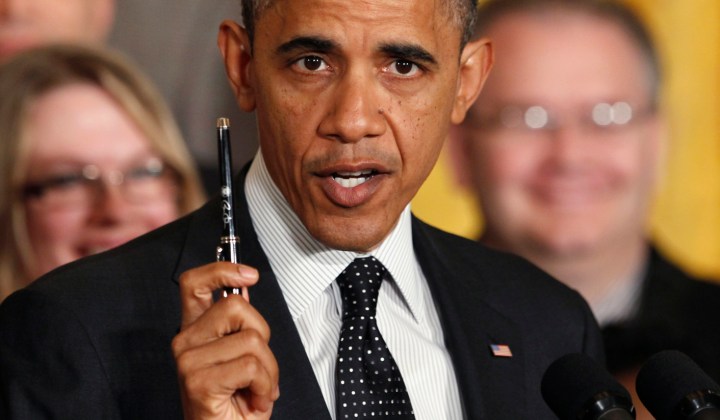World
Searching for a legacy: Obama’s foreign policy 2.0

Most American presidencies are ultimately about domestic policy debates, challenges, or outright pitched battles (the one-term presidency of George HW Bush at the end of the Cold War serving to prove the rule). Should they be granted a second four-year term, presidential thoughts and gazes begin to look at things foreign and distant. By J BROOKS SPECTOR.
Domestic policy in the US is often fought over in an enervating war of attrition among the executive, opposition forces in the Congress and throughout society and in the economy at large. By contrast, foreign policy is constitutionally more fully the president’s prerogative (except budgetarily) and the rewards have real comparative advantage. Foreign policy is real legacy territory, as a president bestrides continents, makes peace among nations, smites the wicked, soothes the afflicted and salves the weak. And besides, it is more fun on that high wire for a worldwide audience that expects an American president to perform up there in high-risk, high-gain territory.
And so, soon enough, Barack Obama may well start looking more and more to foreign shores and foreign problems to help secure a legacy for his presidency. After all, on top of his precedent-setting win as America’s first African American chief executive and his re-election as well, he has secured the institutional future of Obamacare, likely quelled the meltdown of the economy post-2008 and possibly even set the nation’s political dynamic on a course for a long-term compromise with his GOP rivals over taxes, the budget, Social Security and Medicare cost control and perhaps even the deficit and the national debt. Perhaps. But the potential for the epochal impact of a Nixon-goes-to-China moment will always lie out there, a foreign policy version of Captain Ahab’s white whale.
Something of this may even be part of the equation of the newly announced presidential trip to Myanmar/Burma, Cambodia and Thailand. Myanmar is terra incognita for an American president. But with domestic political liberalisation moves in that country now afoot, including the political freedom of that country’s own struggle heroine, Aung San Suu Kyi, a visit there is the perfect place to demonstrate a US commitment to political freedom. It also gives a sharp nudge to an increasingly assertive China, Burma’s long-time lead trade partner and international ally.
American foreign policy has always been something of a balancing act between ideals and real politick. This is the tension inherent between John Winthrop’s 1631 vision of the nascent America as “the shining city upon the hill; a light unto the nations of the world” and British Foreign Secretary Lord Palmerston’s famous 19th century admonition that a nation has no friends, only interests.
The problem for the US has sometimes been that “the city on hill” itself can warble between an honest, heartfelt effort to promote democratic ideals and an equally transcendent but less defensible goal to tear down and rebuild in America’s own image. At its worst, it morphs into that infamous “we had to destroy the village to save it”. In fact, real politick also has its own internal tension, it can fluctuate between an isolationism that turns the country’s back on the problems of the world and an embrace of authoritarian rulers in order to bolster short-term tactical advantage.
Over the next several years, Obama will, whether he wishes it or not, have to find ways to cope with a humbling array of international relations issues and balance all those tensions and contradictions as well. Some issues may offer chances for real legacy-style payoff; others will simply need for policy makers to find ways to keep the lid on until those cans can be kicked down the road still further into the future. The administration’s responses to these will be influenced by the government’s freedom of action and will be constrained by pressures on the national treasury. Even old reliable activities like foreign aid will be under pressure from congressional budget hawks and the tradeoffs that might have to come from any budgetary grand bargain.
What are some of the Obama administration’s key foreign policy opportunities and challenges? Travelling eastward from Washington, there is, first of all, the continuing uncertainty of the euro zone crisis. While this is, first and foremost, the EU’s members’ task to solve, the failure to do so could help push American financial institutions into difficulties and could contribute to a dreaded double dip recession in spite of the US’s slow but reasonably consistent economic growth. As a result, while the US is going to be looking for ways to bolster the euro zone it is unlikely to offer much more than cheerleading.
Finding more common ground with Vladimir Putin’s Russia is another tough issue, and as Obama will want to re-reset those now-prickly bilateral ties. The aim will to draw Russia into more enthusiastic participation in dealing with Assad’s Syria, an unfathomable North Korea and a problematic Iran even as the Putin administration’s pressures on human rights/free speech advocates are increasingly criticised by international civil society bodies.
Meanwhile, the ongoing civil war in Syria will keep Americans preoccupied. This will come as the Obama administration tries to support anti-government forces without any commitment of military force – there is simply no appetite for it among most Americans. Concurrently, figuring out coherent ways to deal with the unwinding of traditional authority in other Arab societies in the aftermath of the Arab Spring will successively confound and challenge Obama’s second term. There simply is no agreement in the US yet on what works best, or how to connect with modern Islamist movements and parties in many of these nations. This challenge will not fade for years to come.
Simultaneously, finding a way to press Israel on settlements, restrain it from a possible attack on Iran’s nuclear facilities and push it into a reinvigorated negotiating relationship with the Palestinians will both tantalise and frustrate American policy makers. Foreign policy legacies lead through the Arab-Israeli imbroglio, but there is no clear roadmap that isn’t entangled with US domestic politics. There is a Nobel Peace Prize for the man or woman who finds this particular yellow brick road to the Emerald City, but no one yet has the right map. Meanwhile, finding a real modus vivendi with Iran has eluded every administration since Jimmy Carter’s, but the temptation is there for this in the second Obama term of office as well.
While Obama has withdrawn US forces from Iraq and is on course to do so from Afghanistan within two years, the real challenge will be to restore a semblance of calm to the fraught US-Pakistan ties. These are now deeply troubled by the ongoing use of drone craft to strike targets and the resulting collateral damage from their use. This is further complicated by Pakistan’s ownership of nuclear weapons and its rivalry with American ally India as well.
The challenge posed by increasingly assertive China in terms of force projection, as well as trade tensions between the numbers one and two world economies, will continue. The real test of the Obama administration may well lie in how well it deals with China and its incoming leader, Xi Jinping. At its root is figuring out what mix of military and other tools will be the best to guide China and the US into cooperation, not confrontation. For many analysts, this relationship is the closest contemporary equivalent there is to Wilhelmine Germany’s challenge to Victorian and Edwardian Britain, and historians note that particular competition didn’t turn out so well. Accordingly, this the new pairing may be the big foreign policy challenge of the 21st century – even more than the one coming from non-state terrorism of the al-Qaeda franchise variety.
Beyond these issues are the global and regional issues of climate change, nuclear weapons proliferation, food security, pandemics, piracy, international crime, cyber-terrorism, African growth and trade enhancement and everything else that keeps think tankers up all night. This list is so daunting, in fact, that the Obama administration may well return its gaze to potentially less intractable issues of domestic tax policy and Medicare reform. Or not.
There is still the small matter of that Nobel Peace Prize, awarded right at the beginning of the Obama’s first term, to be fully and completely justified. That is likely to be something that will continue to beguile the president and his team in the years to come. DM
Read more:
- “Obama plans to visit Myanmar during upcoming Asia trip, White House says,” on CNN
- “Words and Deeds Show Focus of the American Military on Asia,” on The New York Times
- “An Array of Relationships for Obama to Strengthen and Redefine,” on The New York Times
- “President Obama’s foreign policy opportunity,” on Politico
Photo: U.S. President Barack Obama holds up a signature pen as he delivers a statement on the U.S. “fiscal cliff” in the East Room of the White House in Washington, November 9, 2012. REUTERS/Kevin Lamarque



















 Become an Insider
Become an Insider